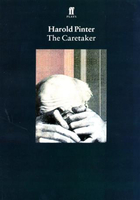Growth, Then Decay, Then Transformation
"I am awake."—Walter White
Walter White enters the story of Breaking Bad at full speed, tearing down a New Mexico desert highway in his new mobile meth lab, a ventilator mask on his face, no pants on his hairy legs, a trio of unconscious (or worse) men rolling around in the RV. Though we know nothing about him at this point, nor how he came to be in this predicament, when Walt (Bryan Cranston[1]) removes the mask to record a video message to his family, it's clear from his words, his tone, and the pained look on his face that he never imagined his life would one day lead him to this moment.
But, given his new vocation, maybe he should have guessed.
After that gorgeous,[2]surreal, in media res prologue—which opens with the image of Walt's missing pants floating through the sky, so filled with air they look like they have an invisible man inside of them, and closes with Walt standing in the middle of the highway in his shirt and jockey shorts, a gun pointed in the direction of the sirens that are fast approaching—the pilot jumps back to show us the depressing existence that led Walt here. Though his house on 308 Negra Arroyo Lane contains mementos of past scientific triumphs (including work on a Nobel Prize–winning proton study) he has somehow wound up teaching high school chemistry—a task he seems even more bored with than his students, and one that pays him so little that he has to work a second job at a local car wash.[3]His pregnant wife Skyler (Anna Gunn[4]) chooses to celebrate his birthday with a plate of veggie bacon, a surprise party he doesn't want, and a distracted hand job that she performs while monitoring an eBay bid.[5]His wardrobe,[6]his ugly green Pontiac Aztek, and everything else about his life are as drab and unremarkable as they can be.
In a lecture about why he loves chemistry, Walt suggests that he views the field as "the study of change," using a Bunsen burner and different chemical sprays to change the flame's color, and promises that his classroom will witness "growth, then decay, then transformation!" It's a loud, flashy demonstration that fails to break through to a single student, but the speech serves as Vince Gilligan's mission statement for Breaking Bad. We are going to watch Walter White be changed—first by the discovery that he has inoperable lung cancer, and then by his terrible decision to cook crystal meth with former student Jesse Pinkman (Aaron Paul[7]) as a way to provide for Skyler, Walter Jr. (RJ Mitte[8]), and the baby after he's gone—in ways far more colorful and varied than the burner's flame.
One of the many smart choices Gilligan makes as both writer and director is to constantly remind us that Walt is a man of science whose whole life has been devoted to chemistry. There are chemicals everywhere he goes, from the samples in his classroom to the cleaning products at the car wash to the ingredients he and an incredulous Jesse will use to cook glass-grade meth. We don't know if overexposure led to the cancer, or if it was just the luck of the genetic draw, but when Walt coughs himself into a collapse while wheeling a chemical barrel around, it unfortunately seems like more than a coincidence. When Walt's at the hospital getting scanned, Gilligan shoots it from an angle suggesting science fiction as much as science—aliens may as well be performing some kind of cruel experiment on Walt to see what will happen to him under extreme stress. And what activity does Walt undertake to calm his nerves and distract himself from the awful turn his life has taken? He sits by his swimming pool, lighting one match after another, admiring the chemical reaction that turns an anonymous wooden stick into a bright red flame, little realizing that he is now the match, ready to ignite.
And ignite he does, following a ridealong with Hank Schrader (Dean Norris[9]), the DEA agent husband of Skyler's sister Marie (Betsy Brandt[10]), and Hank's partner Steve Gomez (Steven Michael Quezada[11]) that reunites him with Jesse, who has used Mr. White's science lessons to help establish an identity as a low-level meth manufacturer named Cap'n Cook, and who provides Walt an entrée into the local drug economy. But it's a disaster almost instantly. This isn't the cute, sitcommy story of a suburbanite bumbling his way through a life of crime; this is an hour of television that climaxes with Jesse's ex-partner Emilio (John Koyama) and Emilio's cousin Krazy-8 (Maximino Arciniega) trying to murder Walt and Jesse, and Walt using his gift for improvisational chemistry to turn the tables, possibly fatally, on them. It's not at all what Walter White expected when he got into this, and it may not be what much of the audience expected when they heard about the show and saw that Bryan Cranston—best known as the hapless sitcom dad from Malcolm in the Middle[12]—was starring in it.
Through all of this, Cranston has to convey a lifetime of disappointment and pent-up fury so the audience will empathize with his plight, but also understand why he might be arrogant enough to think he can just slide into a life of crime without hurting anyone or getting hurt in turn. There is an angry, dangerous man lurking beneath all those earth tones, and though the anger emerges here in quasi-admirable ways—standing up to the bullies who are mocking Walter Jr.'s disability, or even cooking the meth to ostensibly look after his family—that level of rage doesn't appear from nowhere. It lives inside you, stoked by inescapable thoughts of every mistake, every slight, every piece of rotten luck that has brought you so low that you would consider this a viable, necessary path to take with what remains of your life. In his video confession in the opening scene, Walt promises his wife and son, "I just want you to know that no matter how it may look, I only had you in my heart." But did he? Would even the most devoted family man, possessed with our protagonist's unique scientific genius, really go down this road if there wasn't something darker already there?
In the premiere's closing moments—after Walt has saved his own life and Jesse's, apparently by killing Emilio and Krazy-8 (and after he has literally laundered the bloody money he took from his victims, because he's just that new at this)—he stuns Skyler with an aggressive sexual maneuver of the sort the eBay hand job scene made clear didn't happen anymore.
"Walt?" Skyler asks. "Is that you?"
This will be the central question of Breaking Bad. The man in bed with Skyler is someone unfamiliar to her, and the man in the RV would be a total goddamn stranger. But is this some brand-new monster created by the cancer diagnosis, or is this who Walt really was all along?
NOTES
[1]Cranston's career began in the early '80s with episodic guest work and a regular role on the daytime soap opera Loving. Prior to Breaking Bad, he was most famous for sitcoms, both as panicked dad Hal on Malcolm in the Middle (a role for which he received three Emmy nominations) and as kinky, regifting, converted Jewish dentist Tim Whatley on Seinfeld. But it was a dark guest turn as a racist carjacker on an X-Files episode called "Drive" that put him on the radar of that episode's writer: Breaking Bad creator Vince Gilligan.
[2]With only a couple of X-Files episodes to his credit as a director, Vince Gilligan recruited Oscar-winning cinematographer John Toll to work with him on the pilot, and the two set a stunning visual template for all that would follow. The shot of Walt's pants flying through the air is a work of art in itself, but the compositions throughout are as beautiful as they are useful in moving the story along and establishing the show's many themes.
[3]Bogdan, Walt's boss at the car wash, is played by Marius Stan, a successful scientist in his own right. He was working at Los Alamos National Laboratory at the time the Breaking Bad pilot was being cast, and when his son and daughter both wanted to audition, he came along merely to chaperone. Instead, the show's casting directors were fascinated by his look (which inspired Walt's "Fuck you—and your eyebrows!" kiss-off line) and hired him to play Bogdan; the kids got non-speaking parts. That's showbiz.
[4]Like Cranston, Gunn did a lot of TV guest star work in the '90s (including her own Seinfeld appearance, as a girlfriend of Jerry's whom George, while missing his eyeglasses, mistakenly thinks he sees kissing Jerry's cousin). Her most prominent role prior to Breaking Bad was as Martha Bullock, the reserved wife of Deadwood sheriff Seth Bullock.
[5]The original version of the pilot ran fifty-eight minutes without commercials, and AMC aired it in an extra-long timeslot to fit it all. Later airings eventually cut out about ten minutes, including the Skyler/Walt hand job scene, and that shorter version was the only one available on Netflix for a long time. So viewers were introduced to the realities of the White marriage very differently depending on when and how they watched.
[6]It's also a mark of how shabby a life Walt has that he refers to his ugly, cheap-looking shirt and pants as "my good clothes." Cranston helped contribute to the depressingly bland look of his character, whom he felt was always trying to disappear from his own life—working with the show's wardrobe, hair, and makeup people to erase as much color from Walt's life as possible, right down to removing the natural red highlights in Cranston's hair. Cranston had Walt dress in neutral clothing, and the actor grew a thin mustache that he wanted "to be impotent. I wanted the mustache to have people subconsciously go, 'What's the point of that mustache? It doesn't make any sense. Why would you bother if that's all you can grow?'"
[7]Paul, like Cranston, guest starred in a latter-day X-Files episode (written by Gilligan's old friend—and future Breaking Bad writer—Thomas Schnauz). And like Anna Gunn, he did a stint on a mid-'00s HBO drama, with a recurring role on Big Love as the love interest of Sarah Henrickson.
[8]Breaking Bad was the first significant acting role for RJ Mitte (unless you count his appearance as "School Jock" on Hannah Montana). Mitte has cerebral palsy, but his is less severe than Walter Jr.'s, and he had to adjust to walking with crutches for the run of the series. Fortunately, since most of the character's big scenes take place around the Whites' dining room table—particularly when breakfast is being served—it was never too much of a physical strain for the actor.
[9]After Cranston, Norris was the most recognizable actor in the original cast, even if most viewers probably recognized him as "that cop from that thing!" He has one of those faces that seems to scream "law enforcement" (at least to casting directors), and prior to Breaking Bad had carried a badge in movies with Mel Gibson (Lethal Weapon 2), Arnold Schwarzenegger (Terminator 2), and Samuel L. Jackson and Kevin Spacey (The Negotiator), among many others. (He also played a U.S. Marshal in an early X-Files.)
[10]Brandt had been acting professionally for a decade prior to Breaking Bad, but the role of Marie was her big break after mostly doing episodic guest roles in shows like ER and The Practice.
[11]The bulk of the series' major roles—both the cast regulars and the guest stars—were played by Los Angeles–based actors like Gunn and Norris. To cut down on travel expenses, though, certain parts were filled with local actors from Albuquerque, none of whom wound up with a more prominent job than Steven Michael Quezada as Gomez. There's never a Gomez-centric episode, or even subplot, but as Hank's partner, he's on-screen more often than all but a handful of the show's more famous guests.
[12]Walt working in his underwear evokes Cranston's time on Malcolm, but Gilligan admits he nearly "wimped out" on putting his leading man in them again, asking Cranston if he might be more comfortable filming the opening scene in sweatpants. To Cranston's credit, he replied, "No, I'm not comfortable, but that's the whole point. What's important to the story?" And what was important was saggy jockey shorts. "God bless him," Gilligan says.
In-Between
"Hey, man: we flipped a coin! WE FLIPPED A COIN!" —Jesse Pinkman
As dazzling as the pilot was as an introduction to the world of Breaking Bad, "Cat's in the Bag …" is in many ways far more representative of the series. The pilot burned through plot ideas—Walt has cancer! Walt and Jesse will cook meth! Krazy-8 and Emilio are going to kill them!—faster than Walt drove the RV in the opening scene, and suggested that the show would continue at that breathless pace.
But what will come to define the series is what Vince Gilligan refers to as "those in-between moments" that your typical crime story won't tell: the slow and awkward progress of Walt's assimilation into the criminal world, and what happens after bodies have been dropped. In most previous versions of the story,[1]disposing of Emilio and Krazy-8 (the latter of whom turns out to be less dead than he first appeared) would be the subject of a montage, or a quick scene, or even just an offhand comment about what a pain in the ass it was to get rid of their bodies.
"Cat's in the Bag …," though, slows the show's pace to a crawl. It makes clear that Walt and Jesse are not master criminals, and that even if Walt knows (a lot) about chemistry and Jesse knows (a little) about the local drug trade, neither of them is in any way prepared to address the many complications that have already arisen from their new venture. They are going to make mistakes, and maybe take three steps back for every one forward, and we are going to watch this slow and agonizing process in what will damn near feel like real time.
This time out, we are witness to two big mistakes, each somewhat understandable on its own, but disastrous for the current ugly state of things. The first is that Krazy-8 is very much not dead, and will have to be dealt with. The second is that, when attempting to follow Walt's instructions for dissolving Emilio's body in acid to prevent it being traced back to them, Jesse skips a few steps, which results in the acid eating through the bathtub in his house … and the floor below it, creating a much bigger and more disgusting mess to clean up than the one they originally had.
Breaking Bad doesn't always traffic in symbolism, but this is a pretty clear and unapologetic instance of it. Skip steps—whether in corpse disposal or cable drama storytelling—and things get worse than if you move slowly and carefully through each one.
It's also dark and nasty stuff, and if the pilot—with its Malcolm in the Middle alum for a leading man and its seemingly ludicrous premise (a second cousin to the more overtly comedic Weeds)—had left any doubt over whether this was meant to be a comedy or not, "Cat's in the Bag …" should have chased those away forever. It's certainly not humorless, as Aaron Paul gets to mine nervous laughter out of Jesse's understandably disgusted response to the task Mr. White has assigned him, and as he has to endure a judgmental lecture from Skyler White (who has come to believe he's her husband's pot dealer). But on the whole, this is so heavy—and so very much not the kind of devil-may-care adventure either Walt or the audience might have thought they were signing on for—that it deftly establishes a tonal and emotional baseline for what to expect going forward.
Late in the episode, Walt slips away from the bloody business at Jesse's place to accompany Skyler to an ultrasound for their unborn baby, which is identified as a girl. Skyler jokes about how Walt will react to having a sixteen-year-old daughter, and a shadow falls across Walt's face as he realizes he won't be around nearly long enough to witness that. He likely won't even be there to watch her walk for the first time, let alone go to school, start dating, or any of the other steps on the path from baby to woman. It's agonizing for him to consider.
That the episode can present that spare and powerful moment in the same scene where Walt and Skyler will soon be arguing about Walt's alleged marijuana use (a lie he tells her to explain why he's interacting with Jesse Pinkman again), and in the same episode that features a running gag about Jesse's obnoxious outgoing message ("WHAT UP, BEEYOTCH!"), as well as the gruesome image of Emilio's liquefied remains crashing through the ceiling of Jesse's living room—without any of it feeling like stylistic whiplash—is pretty remarkable. And it's made possible by the decision to slow things down so we can appreciate every tiny beat of the story to its fullest.
In-Between Moments
Vince Gilligan on why Breaking Bad moves so slowly, and spends so much time on small details of the story like how Walt and Jesse go about disposing of Emilio's body:
"To me, that is the story. To me, this is the story about the in-between moments. I think we've all seen the big moments in any crime story. You can't top a movie like The Godfather. So what can I do as a filmmaker? At least I can show the stuff that nobody else bothers to show. The in-between moments really are the story in Breaking Bad: the moments of metamorphosis, of a guy transforming from a good, law-abiding citizen to a drug kingpin. It is the story of metamorphosis, and metamorphosis in real life is slow. It's the way stalactites grow: You stare at it and there's nothing, but you come back a hundred years later, and there's growth.
"We've all seen so many TV shows and movies over our lifetimes where the murder is kind of a given, and the aftermath is clean and pain-free and skipped over, and it's on to the next plot point. There's plenty of movies that follow that pattern that I love, but I, as a viewer, have found my mind wandering, and I find myself thinking as I'm watching a crime movie, 'How would you go about killing someone?' The mechanics of it, or the minutiae of it, are oddly interesting to a layperson, to a non-criminal, as is the minutiae of just about any interesting job.
"Those kind of scenes are fun to write, because I think we idly wonder, from time to time, 'If I had to commit the perfect crime, how would I pull it off?' Talking through it, A to B to C, step-by-step, is interesting to me personally, and I figured it might be interesting to an audience."
NOTES
[1]Breaking Bad's decision to address all of the complications of getting rid of an inconvenient body is among the show's most imitated. It's now such a rite of passage for a certain flavor of drama to devote its second episode to corpse disposal that even a show featuring Bryan Cranston's daughter Taylor Dearden (MTV's college vigilante drama Sweet/Vicious) has tried it.
Missing Elements
"This line of work doesn't suit you."—Krazy-8
The title of this episode and the prior one form a complete phrase (about ways to permanently dispose of an unwanted animal, no less), just as the two hours tell a complete story about Walt and Jesse dealing with the ugly physical and moral consequences of their encounter in the desert with Emilio and Krazy-8.
Where "Cat's in the Bag …" (S1E2) focused primarily on the logistics of disposing of Emilio's corpse, here the emphasis is on a much more difficult task. Walt must kill Krazy-8 not in self-defense in the heat of the moment, but while the man sits helplessly in Jesse's basement, chained to a column with a bicycle lock. We're reminded of the matter of Emilio's liquefied, disgusting remains early on; intercut with a flashback of a young Walter White and a lovestruck colleague[1]trying to identify all the elements that make up a human being, Emilio's dissolved body parts act as a subtle punch line to a sick joke that young Walt doesn't even realize he's telling.[2]In the end, young Walt's colleague suggests the missing element is the soul—something the older Walt would have a hard time identifying in himself after he chokes the life out of another human being.
"… And the Bag's in the River" does an impressive job transforming Krazy-8 from the cartoonish heavy Walt was prepared to kill in the pilot into a complicated and intelligent person willing to work every angle to talk himself out of a death sentence. This, of course, is how it has to be in order for his fate to have the power that it does, and for the show to get both comic and dramatic mileage out of Walt's struggle to decide along the way. On the former, Walt's pro/con list about murder (starting with "Murder is Wrong" on the con side) is as priceless—and as telling about how new he is to this world of violence—as him washing the money in the pilot. And on the latter, there's the long scene where Krazy-8 (né Domingo) tells Walt about his family's furniture company, making Walt realize he bought Walter Jr.'s crib there once upon a time. This is a human being, not a snarling gangster caricature. While Krazy-8 ultimately makes Walt's choice for him by hoarding the broken plate shard to use as a weapon, it's nearly as painful for us to watch Walt choke the life out of him—while sobbing, "I'm so sorry! I'm so sorry!"—as it must be for Walt to do it.
It's not just Krazy-8 who opens up to Walt, but Walt who tells him something no other person in his life knows—specifically, that he has cancer. Walt spends much of the hour coughing up a lung, giving physical manifestation to the ugliness brewing inside him. Once the awful deed is done, he finally—inspired in part by the conversation with Krazy-8, in part because Skyler has begun to get wise to his absences[3]—decides to tell his wife something big. It could be the cancer. It could be the meth and murder. It could be all of the above. But everything trapped inside of Walter White is fighting to get out—and lives are being damaged, or destroyed, in the process.
NOTES
[1]This is Gretchen Schwartz, played by Jessica Hecht, who will have much more to do in this season's "Gray Matter" (S1E5).
[2]The opening shot of Emilio's blood and guts being cleaned off Jesse's floor is an early example of what will become a Breaking Bad visual signature: The camera pushes straight through the fourth wall (or, in this case, the floor) between the characters and the audience—visually making us complicit in the act of disposing of this body.
[3]Hank also gets roped into some White family drama, as Marie misinterprets Skyler's questions about marijuana to mean that Walter Jr. has started getting high, which in turn forces an uncomfortable Hank to give his nephew a scared straight lecture. More eye-opening, in terms of Walt's in-laws: Marie walks out of a store wearing a new pair of shoes she hasn't paid for.
Apply Yourself!
"Then why don't you just fucking die already? Just give up and die."—Walter Jr.
Having spent the two previous episodes cleaning up the mess they created upon going into business together, Walt and Jesse spend most of "Cancer Man"[1]dealing with other messes: in this case, the wreckage of their family lives.
Though the two partners appear together only briefly near the end of this episode, their stories parallel one another's throughout, marking the start of Breaking Bad's pivot from being solely Walt's story (where Jesse was originally designed to be someone who dies after introducing Walt into the drug world) to being a two-hander about the teacher and his former student bringing out the best—and worst—in each other.
The hour finds both men returning to the bosom of family, with very mixed results. As Walt attempts to manage the reactions of Skyler and company to the news of his cancer (which is the thing he confessed to her at the end of "… And the Bag's in the River" (S1E3), rather than the meth cooking and/or the murders), a spooked Jesse tries fleeing the drug world[2]to go back to the safety of his childhood home, where his parents understandably have little reason to trust him. Along the way, we get backstory on both sets of relationships—how Walt used crossword puzzles to get Skyler's attention, the many ups and downs between Jesse, his parents, and his much younger brother Jake—while also seeing how mismatched both men are with their loved ones. Walt's family wants him to fight the cancer, no matter what, but he insists on looking at it like the pragmatic scientist he is and points out the huge financial cost of a treatment that's unlikely to work. Jesse wants his parents and Jake to take him back in like it's old times, but he seems to forget that the old times often involved him screwing up and bringing great humiliation to his family.
Once again, the show's greatest power comes in the small details, like the barely contained fury and feeling of emasculation on Walt's face when Hank offers to take care of his wife and kids after he's gone, or Jesse browsing through his youthful drawings and coming across a comical sketch of Mr. White (along with a note telling Jesse to apply himself more—the same dynamic the two have today). Marie, previously established as a bit of a flake (and a petty thief), here rises to the challenge of Walt's condition, roping in all her friends in the medical field (where she works as a radiology tech) to get Walt an appointment with Dr. Delcavoli (David House).
But where Walt's insistence on appearing selfless comes across to Skyler and Walter Jr. as the height of selfishness, Jesse actually is acting selflessly by refusing to rat out Jake for the stray joint—and he permanently destroys his relationship with his parents in the process.[3]
Of course, Jesse has done far worse things recently than what he's wrongly accused of here, and taking the fall for Jake shows that he understands that. Jesse is more self-aware than Walt, and while he might long for his parents, he also realizes they're better off without him.
This same knowledge may be part of what's motivating Walt. Treat the cancer, and he has to continue living in the ruins of a life he doesn't particularly enjoy, and now with added financial burdens. Go out quickly—possibly leaving a meth-fueled nest egg behind—and everyone is freed of the burden of pretending he wants to be there.
Walt's vigilante move at the end of the episode—using some elementary science knowledge to blow up the car of "Ken Wins" (as his license plate calls him), a Bluetooth douchebag (Kyle Bornheimer) who has repeatedly offended him every time they crossed paths—is (like his takedown of the teen bully in the pilot) a fantasy of middle-age wish fulfillment. It's also a disturbing example of who and what he's becoming. Ken Wins's crimes were not really worth blowing up his car (or the potential danger doing so caused to those around it), but Walt's physical transformation makes it clear how much pleasure the act of vandalism gives him, particularly against a smug, well-dressed representative of a world that's been denied to him. He's only in that gas station parking lot because of another coughing fit caused by his cancer, this one troublingly accompanied by blood. But once he gets a chance to impose his will on the universe, the coughing goes away, his posture improves, and he looks every bit like the badass criminal Hank was describing in the opening scene[4](which, in the moment, was comically contrasted with the image of Walt brushing his teeth, looking nothing like Albuquerque's new kingpin).
It may be an exciting development for us as viewers, but this is Walt getting worse, not better.
Saving Jessie Pinkman
Strange but true: Jesse wasn't supposed to survive the first season of Breaking Bad, a plan that Vince Gilligan quickly dropped once he saw what Bryan Cranston's young co-star was doing.
"Fairly early on in the process of shooting the season," Gilligan says, "I did jettison that idea, because Aaron Paul was such a star."
"He was supposed to die somewhere in the fourth or fifth episode, I think," recalls Cranston. "It's a credit to Vince and the writers to be able to let the pendulum swing in a different direction. And that's what good, good writers do. They will have a basic broad stroke idea of where they're going, but not finalize anything. It's like trying to decide what you're going to wear next week. He saw something, saw the dynamic between Jesse and Walt, the oil-and-water mix, a great opportunity for humor and a lot of things. And Aaron Paul's mastery of all that was great."
Paul only learned about his alter ego's brush with mortality after the fact.
"Vince was having lunch with the other writers," Paul says, "and they brought me over and said, 'You know, we were going to kill Jesse off in the first season.' And I still haven't read the next episode yet! And I go, 'Yeah, what does that mean?' Vince says, 'Well, that's not going to happen anymore.' … I guess once he shot the pilot that changed his mind. He wanted to keep Jesse around. Thank God."
NOTES
[1]The episode's title is a wink to Vince Gilligan's X-Files days, since "Cancer Man" was one of several nicknames given to that series' chief villain.
[2]Meet Jesse's drug buddies Combo and Skinny Pete, played by, respectively, Rodney Rush and Charles Baker. Initially in the script, they were referred to as "Chubby Stoner" and "Skinny Stoner," but Rush and Baker made enough of an impression that they were not only asked back, but given names.
[3]This is Jake's (Benjamin Petry) first and only appearance on the series, but there was clearly more to unpack in the relationship between the brothers: Jake envies the attention their parents shower on Jesse (even if it's all negative), and he appears unconcerned that his joint has seemingly cut Jesse out of the family for good.
[4]The DEA briefing also reveals that Krazy-8 was the one snitching for Hank and Gomez (and would likely have turned Walt in to them, as a bloodless way to eliminate yet another rival, had he left Jesse's basement alive).
The Point of No Return
"Wanna cook?"—Walter White
No matter how inclined you are to forgive Walter White his sins—even at this incredibly early stage of Breaking Bad—"Gray Matter" is a point of no return sort of episode.
It was one thing to justify his choice to cook meth as the act of a desperate man who believed himself to have no other options, and to excuse everything that followed as the unexpected fallout of that one terrible decision. But this reasoning fails in "Gray Matter," when Walt is offered a Get Out of Crime Free card and declines it because he's too damn proud.
The certificate commemorating Walt's work on a Nobel Prize-winning study in the pilot suggested a more glorious past than that of your average high school chemistry teacher, and the flashback in "… And the Bag's in the River" (S1E4) showed us how close Walt and Gretchen once were. Here, we get the full, mortifying picture of the road not taken, as Walt and Skyler attend the birthday party of his ex-partner Elliott Schwartz (Adam Godley), who has become fabulously wealthy thanks to the company he founded with Walt and Gretchen, and who is now the one married to Walt's ex. This would be a bitter pill to swallow for anyone with even a normal level of self-regard; for Walter White, the only possible response is to spit the thing out and tell the world where to stick it.
Skyler's not comfortable around Walt's old colleagues and their wealth (amplified by the fact that her pregnancy forces her to wear a ridiculous prom dress to the party), but she sees in them Walt's salvation. If the cost is the only thing keeping Walt from getting treatment, why not ask the friends who made a fortune from Walt's work to cover the expense?
Perhaps if Elliott had remembered how fanatically prideful his old partner was, he could have made a more successful attempt at the charade. Walt does, after all, seem intrigued by the idea of getting out of the classroom and going back to Gray Matter, even if he'd be working beneath the people who were once his peers. But the second Elliott mentions health insurance, it's all over; we don't even need to hear Walt's verbal response to this offer, because the ugly look on his face makes it clear he views Elliott's gesture as a degrading act of pity.
We're also starting to learn that Skyler doesn't give up, particularly when it comes to protecting her family. So when the play with Elliott doesn't work, she resorts to more direct confrontation with Walt, staging an intervention with Marie, Hank, and Walter Jr. Cable dramas of this type tend to treat interventions as excuses for comedy, and though this one starts there—with gags about the cheese plate and the talking pillow and Hank's awkward poker and sports metaphors—it moves into sincere, emotional territory when Walter Jr. again lays into his father. This shames Walt into tears, but not enough to change his mind about risking the devastating side effects of chemo for little or no chance of success. It's Walt again being selfish and selfless at the same time, insisting that he doesn't want them to remember him as a man too sick to do anything. Walt changes his mind the next day, but our first glimpse of his treatment shows radiation techs wrapping him up in plastic like he's already a dead man, underlining why Walt was so unwilling to try it in the first place.
Where Walt seems reluctant to take the way out—of both cancer and the drug game—offered by his wife and his ex-partners, Jesse spends most of "Gray Matter" realizing he doesn't have many other options professionally, and that he's now been infected by Walt's meth-cooking perfectionism. His friend Badger[1]works as the stand-in for the Cap'n Cook–era Jesse, eager to smoke whatever he's made, but Jesse now takes after Walt and can't stand the thought of anyone sampling an inferior product. It's mostly played for laughs, particularly when the two brawl in the desert, but the insidious influence Mr. White has had on his former student's life is already clear. This used to be fun and games for Jesse. Now he's been party to the murder (and disposal) of two people, wrecked his own house, and discovered that he can't even enjoy the act of making the stuff that he used to enjoy if it doesn't measure up to Walt's chemical standards.
A Matter Left Gray
Though Walt's departure from Gray Matter is perhaps the single most important part of his origin story prior to the events of the series, Breaking Bad never entirely revealed what happened. The writing staff had it all mapped out, though, and let their knowledge inform Walt's awkward conversations with Gretchen and Elliott. Here's how Peter Gould explains it:
"This one, we did discuss a lot. There were any number of versions, but the way I remember it best, Gretchen and Elliott and Walt were a trio, all science graduate students. They had an idea for a company, a breakthrough. And in a trio, there's always an odd man out. The odd man out in this trio was Elliott. Gretchen and Walt were really into each other. Gretchen was infatuated with Walt, and vice versa. As this was going on, Gretchen and Walt traveled to meet her family. She does not carry on airs—there's no sense of this when you meet her in this period—but she's actually from serious money. We always talked about her family having one of those grand old estates in Rhode Island. Walt goes and visits and feels completely overwhelmed by this circumstance. He becomes very aware of the fact that he's from working-class or lower origins, and suddenly he feels less than. And right in the middle of this weekend—which is a big step in any relationship: You meet your girlfriend's family—Walt just leaves. One morning, Gretchen goes up, and he's cleared out. He just left. And he comes up with a reason, but essentially, he and Gretchen break up over this, because Walt can't really say what's bothering him.
"But still, Walt, Gretchen, and Elliott are working together, and now that Gretchen is available, Elliott makes his interest known. And the triangle moves in the other direction. It's serious, and Walt feels left out. And also, their little business is not doing well at all. They come to a crossroads where they all have to chip in a little bit more, and Walt just says, 'I'm out. You guys can just buy me out.' And they buy him out for a very small amount, because the company isn't doing well. It's not just a business situation. It's about feeling jealous, like he missed his chance with Gretchen, and feeling less than, and about pride. He walks away from this and says, 'Good luck.'
"And then this struggling operation, which seems like a hopeless dead end, explodes and becomes a tremendous success. And there were probably times Gretchen and Elliott reached out to Walt and said, 'We feel bad about this. Would you like to come back in and work with us/for us?' and he, of course, said 'no,' because he couldn't endure the daily embarrassment of being reminded that they did so well without him."
But Walt has also been absorbed into Jesse's life, too, and decides he'd rather keep cooking than take Gretchen and Elliott's money in order to pay for his treatment. He wants help from no one, not even a family member like Hank, who here gets Walter Jr. out of trouble with the local cops in a way suggesting he's more than just a cool uncle—a relationship Walt resents nearly as much as he does the success of his ex-partners. Cooking keeps him feeling independent, and alive, despite the awful things he's already done, just as the partnership gives Jesse a chance to achieve the perfection he couldn't in his cook with Badger. No matter how unpleasant Walt might have found accepting charity from the colleagues who have so obviously eclipsed him, he rejected a solution to his problems that was free of violence, criminality, and all the other risks that he is about to unleash onto himself and his family. He and Jesse already need each other, and very bad things are going to happen because neither man can walk away—even when one of them has a gift-wrapped opportunity to do so.
NOTES
[1]Following the entrance of Combo and Skinny Pete in the previous episode, Jesse's inner circle of friends is complete with the introduction of Badger, played by Matt Jones. Because Aaron Paul is relatively small of stature, the pairing of him with Jones makes for an amusing contrast and great physical comedy throughout the show.
Enter Heisenberg
"This … is not meth."—Walt
Enter Tuco. Enter Heisenberg.
After the previous four hours took a step back from Walt's life of crime to better establish the characters, their environment, and the clumsy dynamics of the Walt/Jesse partnership,[1]"Crazy Handful of Nothin'" dives deep back into the world of drugs and violence. Just as Walt's newly shaved head makes him look more badass (or at least his son thinks so), this episode takes the show to a new and frightening level. This is where the legend of Heisenberg begins.
Of course, most legendary figures require an opponent, and Walt gets his first one in local meth kingpin Tuco Salamanca (Raymond Cruz).[2]Tuco seems to be everything Walt's not: physically imposing, erratic, prone to violence, and a user of his own product.[3]Jesse's attempt to sell him some of their pure crystal ends disastrously, with Jesse in the hospital and Tuco keeping the drugs (which he literally used to beat Jesse—a bit of symbolism Jesse might have been wise to pay attention to) without paying for them.
Between Jesse's injuries and the arrest of Hugo—the friendly school custodian who, not long after he helps Walt get through a vomiting spell in the boys' bathroom, is falsely arrested by Hank and Gomez when they trace the mask Walt left in the desert back to his high school—people (beside those who use the product) are being seriously hurt by Walt's attempts to play drug dealer. (Hank doesn't think of Walt as a suspect for the same reason Walt is able to so easily bluff him at poker: Hank can't imagine his brother-in-law being capable of deception even in a simple card game, let alone involved in the kind of business Hank investigates every day.) Yet, rather than take a step back from this madness before it causes any more collateral damage, Walt instead decides to go all-in. He marches directly into Tuco's lair for a wild stunt—gaining entry by pretending that an explosive bag of fulminated mercury is meth, blowing out the windows of Tuco's office, and then threatening to blow everyone in it to kingdom come if Tuco won't cut him a deal—that could have easily caused many more deaths, including his own.
In order to deal to Tuco without giving away his true identity, Walt adopts the pseudonym Heisenberg—the name of the German physicist who coined the famous uncertainty principle, which states that the velocity and position of a particle can't be measured exactly at the same time. With Heisenberg's first act—which is more explosive in every way than the incident with Ken Wins's car battery in "Cancer Man" (S1E4)—Walt not only fully embraces a violent life, but also establishes himself as a wild card whose behavior can never be properly predicted by his enemies. Even with the shaved head, he still looks and carries himself like a middle-aged man who would never be capable of being a genuine threat to someone like Tuco—yet he outwits and outguns an entire roomful of the kingpin's lackeys.
It's thrilling to watch, but also profoundly unsettling, because it's clear from the look on Walt's face, after the fact, how much he enjoyed what he did. People are being hurt, but Heisenberg is being feared, and Walter White is getting the respect he so desperately craves.
NOTES
[1]Jesse finally finds out about the cancer—and realizes it's what's been motivating their partnership. It provides them with another reason to bond, since Jesse's aunt died of cancer after undergoing treatment similar to Walt's.
[2]There's more than a little Spaghetti Western in the DNA of Breaking Bad, which is why Tuco was named after Eli Wallach's wily gunslinger from The Good, the Bad and the Ugly.
[3]Tuco is recently out of prison (which is where he met Skinny Pete), but the reason for his incarceration won't be explained until Better Call Saul, Breaking Bad's prequel spin-off.
The Agreement
"Where did that come from, and why was it so damn good?" —Skyler
"Because it was illegal." —Walt
On November 5, 2007, the Writers Guild of America went on strike, as its members fought for their proper share of the profits in a rapidly changing business. This meant that all movie and TV scriptwriting had to stop until the strike resolved itself, which led many TV series in 2007 and 2008 to have severely truncated seasons.
One of those strike victims was this first season of Breaking Bad, which was just beginning to build real narrative momentum with the introduction of Tuco when production had to shut down for lack of scripts. On the one hand, this makes "A No-Rough-Stuff-Type Deal" a poor season finale, since it was never intended to be anything but another brick in the middle of the larger wall Vince Gilligan and company were trying to build that first year. On the other hand, the strike coming when it did[1]prevented Gilligan from taking the story in directions that even he later admitted could have destroyed the series.
Watched today, out of the context of the original air schedule, "A No-Rough-Stuff-Type Deal" simply feels like a solid—if slightly unsatisfying on its own, since it mainly exists to set up stories still to come—episode of a series that's slowly but surely coming to understand its own strengths and weaknesses, just as much as Walt is as he becomes more and more comfortable in the skin (and now, the porkpie hat) of Heisenberg.
When making decisions about the cosmetic details of his new trade, Walt is still a rank amateur—a suburban dad[2]fumbling in the dark while trying to hide everything from his family.[3]He foolishly insists on meeting Tuco at an isolated junkyard—"This is like a non-criminal's idea of a drug meet," Jesse complains—rather than a more public (and physically safer) location. When he needs to buy ski masks for the robbery he and Jesse plan to commit, he chooses silly-looking ones with pom-poms on the top. Even the porkpie hat seems designed to call attention to itself,[4]especially since Tuco has already seen Walt's bald dome. But though he doesn't yet know how to look or carry himself like a criminal mastermind, Walt and Jesse are still able to pull off amazing criminal feats. The theft of the methylamine barrel is largely bumbling and panic-inducing, and yet Walt's chemical genius carries the day;[5]he's able to make thermite from the aluminum powder found inside an off-brand Etch A Sketch and use that to burn through the warehouse lock. It's not as flashy a stunt as the exploding mercury in Tuco's office, but it gets the job done, and it gives the pair enough raw material to stay in production for a long time—or, at least, as long as Walt's health will last.
As effective as they are at cooking the stuff (and acquiring the supplies necessary to do so), Walt and Jesse are still woefully unprepared to deal with the intense violence that comes from an alliance with Tuco—a man who ends the abbreviated season by beating one of his soldiers half to death for the crime of presuming to speak for him. As cliffhangers go, it's not a stunner, but it's brutal enough to signal just how bad a spot our protagonists have found themselves in, and to make the viewer eager to see when and how they'll get out of it. For the small handful of people watching the show live back in 2008, there would be a long wait. For the many who caught up on the show years later via binge-watching, they'd get to enjoy the next step in the story—and the big creative leap that came with it—immediately.
Saving Steve Gomez
So how would season one have ended if not for the strike? Vince Gilligan and Peter Gould recall the writers playing with two different possibilities before production shut down—both exciting at the time, and both potentially ruinous had they actually been filmed.
In one, the Whites' house would be invaded by criminals who knew Walt and who would take Walter Jr. and Skyler hostage to demand Walt's drug money. A terrified Skyler would insist that they had the wrong house, right as Walt produced a bag full of cash he had hidden in a vent; the season would end on the horrified look of realization on her face.
"It would have been a great scene, and I don't know where the hell we would have gone after that," says Gould.
The other would have involved Tuco shooting Steve Gomez, who would recognize Hank's brother-in-law as he bled out, forcing a terrified Walt to run off into the night, covered in Gomez's blood.
"It would have been an arguably more exciting season one," Gilligan says, "but it would have left us with so many fewer avenues, and ultimately, we might have had one or two fewer seasons. Or we would've had one or two seasons where we had gone past the apex and were starting to slide into familiarity."
NOTES
[1]The timing of the strike turned out to be useful in another way: Had it begun even a week or two earlier, only six episodes might have been completed, which by Emmy rules would have forced Breaking Bad to compete in the miniseries categories, since seven is the minimum episode total required to qualify as an ongoing show. That seventh episode allowed Bryan Cranston to win his first Emmy for Outstanding Lead Actor in a Drama Series.
[2]Skyler's baby shower finally gives their unborn daughter a name (Holly) and sprinkles in some comedy along the way. But it's most memorable for a lovely piece of acting by Bryan Cranston, where Walt's discomfort at being around all these people melts away for a moment as he records a message to the daughter he assumes will grow up without him. Speaking honestly and warmly, he tells her, "Holly, I am very proud of you, and I think about you all the time. Wherever you go, whatever you do in life, always know that you have a family who loves you very much."
[3]Marie shoplifting the shoes in "… And the Bag's in the River" (S1E3) turns out to not to be an isolated incident: Skyler's attempt to return the gaudy tiara Marie gave her at the shower gets her into trouble when it turns out Marie stole it. Less notable than Skyler learning her sister is a kleptomaniac is Skyler demonstrating a skillful ability to lie to authority figures, as she fakes labor pains to get released from the store manager. This kind of quick thinking might just prove handy if she ever gets involved in her husband's business.
[4]And would, in time, make it very easy to dress as Heisenberg on Halloween.
[5]Jesse's exhortation of "Yeah, Mr. White! YEAH, SCIENCE!" is a marvelous bit of comic delivery by Aaron Paul, and among the most quotable lines of the entire series.















